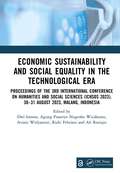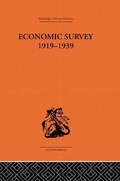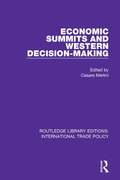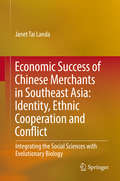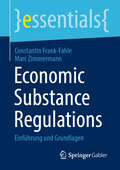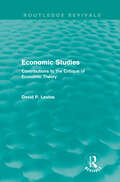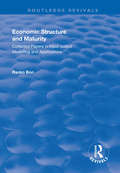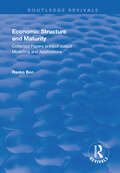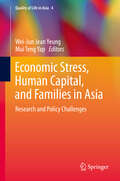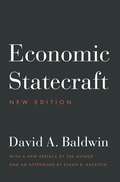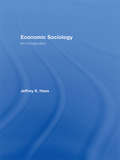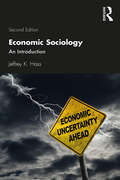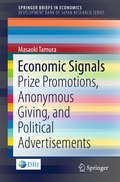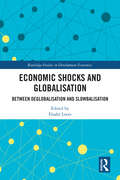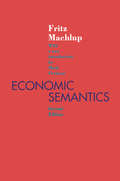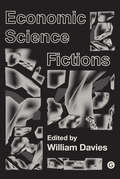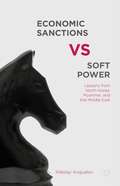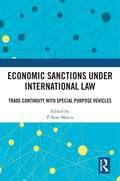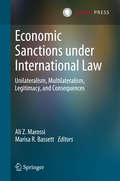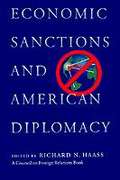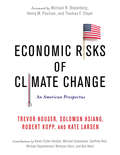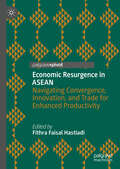- Table View
- List View
Economic Sustainability and Social Equality in the Technological Era: Proceedings of the 3rd International Conference on Humanities and Social Sciences (ICHSOS 2023), 30–31 August 2023, Malang, Indonesia
by Ali Roziqin Dwi Irawan Agung Prasetyo Nugroho Wicaksono Aviani Widyastuti Rizki FebrianiThis book is a comprehensive compilation of academic papers and presentations delivered at the conference. It brings together research from various disciplines within the humanities and social sciences, such as cultural studies, sociology, psychology, education, literature, and history.It meticulously covers several critical areas of study, reflecting the diverse and interdisciplinary nature of the conference. In the realm of post-pandemic economic development, it explores strategies for economic recovery and resilience, highlighting the role of finance and social capital in rebuilding economies. Technology and sustainable cities are examined through case studies and theoretical frameworks that discuss smart city initiatives, technological integration, and sustainability practices. The section on economic development, accountability, and finance risk delves into methods for ensuring transparency and managing financial uncertainties in a globalized economy. Social and environmental policies and planning are addressed with a focus on creating equitable and sustainable communities.This text will be valuable to academics, researchers, and students in the fields of humanities and social sciences.The Open Access version of this book, available at http://www.taylorfrancis.com, has been made available under a Creative Commons [Attribution-Non Commercial-No Derivatives (CC-BY-NC-ND)] 4.0 license.
Economic Survey
by W. Arthur Lewis'A masterpiece of succinct analysis.'New Statesman 'Penetrating in analysis and closely packed in thought.' Financial Times Analysing and examining the history of the economic events of the inter-war years, this book gives the reader both a sense of perspective of the larger scene of events on an international scale, whilst introducing facts and theories. National policies of the UK, France, Germany, the USA, Japan and the former Soviet Union are discussed as are developments in international trade.
Economic Summits and Western Decision-Making (Routledge Library Editions: International Trade Policy #8)
by Cesare MerliniSince 1975 the leaders of the major western economies have gathered in annual summit meetings to try to agree a unified response to the main political and economic problems facing them. This book, first published in 1984, traces the development of the summit meetings and tries to assess their impact on western decision-making and international relations in general. The summits arose as the product of a serious crisis that shook the world economy in the early 1970s. They have been sustained because of the waning of the American hegemony that had supported the postwar international economic regime. From this it became vital for the leaders of the major economies to reassert collective leadership in order to try to re-establish a new world economic equilibrium.
Economic Success of Chinese Merchants in Southeast Asia
by Janet Tai LandaThis book provides an original analysis of the economic success of Overseas Chinese merchants in Southeast Asia: The ethnically homogeneous group of Chinese middlemen is an informal, low-cost organization for the provision of club goods, e. g. contract enforcement, that are essential to merchants' success. The author's theory - and various extensions, with emphasis on kinship and other trust relationships - draws on economics and the other social sciences, and beyond to evolutionary biology. Empirical material from her fieldwork forms the basis for developing her unique, integrative and transdisciplinary theoretical framework, with important policy implications for understanding ethnic conflict in multiethnic societies where minority groups dominate merchant roles.
Economic Substance Regulations: Einführung und Grundlagen (essentials)
by Marc Zimmermann Constantin Frank-FahleInternational angelegte Steuervermeidungsstrategien von Unternehmen sind in der Vergangenheit in den Fokus der öffentlichen Wahrnehmung gerückt. Offshore-Strukturen wurden u. a. durch multinationale Unternehmen zur Gewinnverlagerung und -verkürzung genutzt. Die OECD hat als Antwort darauf einen BEPS-Aktionsplan entwickelt, der zur Bekämpfung dieser Praktiken vorsieht, dass die Gesellschaft bei Ausführung einer relevanten Tätigkeit eine wirtschaftliche Substanz (Economic Substance) aufweisen muss. Die seitens der OECD aufgestellten Mindestanforderungen bilden den internationalen Standard und wurden in zahlreichen Niedrigsteuerjurisdiktionen umgesetzt. Das essential vermittelt kompakt das erforderliche Grundwissen zu Economic Substance Regulations und informiert praxisnah über deren Umsetzung in den einzelnen Staaten.
Economic Studies: Contributions to the Critique of Economic Theory (Routledge Revivals)
by David P. LevineFirst published in 1977, David Levine's Economic Studies offers a critique and reconstruction of the theoretical conception of economic life. The premise of the study is that only an investigation of the system of elementary economic relations - value, capital, production - can overcome the confusion and misdirection which baffles progress in all areas of economic theory, and lay the foundation for further development of economic science. Levine discusses both the origins of economic science and the character of contemporary economic thought. He presents a critique of the ideas of classical political economy and of the notion of a 'labor theory of value' which excludes the possibility of a science of economic relations.
Economic Structure and Maturity: Collected Papers in Input-output Modelling and Applications (Routledge Revivals)
by Ranko BonThis title was first published in 2000: A collection of Ranko Bon's papers on input-output analysis and its applications. The underlying feature of the papers is a focus on the supply-side input-output model, which better predicts the behaviour of mature economic sectors, such as agriculture and mining, than the demand-sided model. The construction sector is especially relevant in the context of economic stability and maturity issues, as it offers an index of economic maturity for entire economies. This is the main theme that evolves through the papers collected in the book.
Economic Structure and Maturity: Collected Papers in Input-output Modelling and Applications (Routledge Revivals)
by Ranko BonThis title was first published in 2000: A collection of Ranko Bon's papers on input-output analysis and its applications. The underlying feature of the papers is a focus on the supply-side input-output model, which better predicts the behaviour of mature economic sectors, such as agriculture and mining, than the demand-sided model. The construction sector is especially relevant in the context of economic stability and maturity issues, as it offers an index of economic maturity for entire economies. This is the main theme that evolves through the papers collected in the book.
Economic Stress, Human Capital, and Families in Asia
by Wei-Jun Jean Yeung Mui Teng YapThis book presents recent findings about the consequences and policy implications of economic stress for human capital development and family well-being in Asia. The scope of the chapters goes beyond the impact of current financial crisis to include the effect of economic deprivation families in Asia experience as a result of job loss, low-wage employment, and catastrophic natural calamities. The studies show how macro-level economic stress can filter down through households to affect individuals' economic and socio-psychological well-being. The chapters reveal a wide spectrum of economic stresses experienced by families in Asia that is linked to poor human capital development, emotional distress, health problems, changing fertility patterns, more frequent geographic movement, and less supportive parenting behavior. The elderly, women, children, low-skilled workers are particularly vulnerable. The economic shocks in the past several decades have exposed the vulnerability of the family institution and the weaknesses in this region's social protection system that can lead to detrimental long-term effects on human capital development. This book is relevant for researchers and students in fields such as Family Studies, Globalization, Development, Social Problems, Social Stratification, Social Inequalities, Poverty and Welfare, Education, and Social Policies.
Economic Statecraft: New Edition
by David A. BaldwinA new edition of the classic work on the economic tools of foreign policyToday's complex and dangerous world demands a complete understanding of all the techniques of statecraft, not just military ones. David Baldwin's Economic Statecraft presents an analytic framework for evaluating such techniques and uses it to challenge the notion that economic instruments of foreign policy do not work. Integrating insights from economics, political science, psychology, philosophy, history, law, and sociology, this bold and provocative book explains not only the utility of economic statecraft but also its morality, legality, and role in the history of international thought.Economic Statecraft is a landmark work that has fundamentally redefined how nations evaluate crucial choices of war and peace. Now with a substantial new preface by the author and an afterword by esteemed foreign-policy expert Ethan Kapstein, this new edition introduces today's generation of readers to the principles and applications of economic statecraft.
Economic Stabilization and Growth in Portugal
by Hans O. SchmittFollowing a decade of rapid growth with external equilibrium the Portuguese economy in the early 1970s suffered a series of major shocks. Even before the Revolution of April 1974 the increase in world petroleum prices had sharply raised the import bill and, by deepening the recession elsewhere, would soon reduce export earnings and emigrants’ remittances from abroad.
Economic Sociology: An Introduction
by Jeff HassThis insightful key resource presents the clearest, most comprehensive and wide ranging account of economic sociology to date. Hass presents a critical and sophisticated yet approachable analysis of economic behaviour and phenomena. He makes the insights, claims, and logic of economic sociology interactive and accessible to students, while exposing the realities of today’s complex economic world and the challenges of studying economies and societies. This introductory text: provides a sophisticated yet approachable analysis of economic behaviour and phenomena explores economic structures and change from a global perspective-by using comparisons and data from the United States, Europe, East Asia, Latin America, and post-socialist countries shows how domestic and international economic forces work over time to shape modern economies takes a critical perspective of both economic sociology and economics to establish useful insights presents historical narratives showing the development of today’s economic structures and institutions addresses important economic issues directly impacting on students’ lives—from the more visible (economic inequality and organizations) to the less visible (international economic trends, public policy, post-socialism). Incorporating illustrations, case studies, a glossary, chapter notes, and a comprehensive bibliography, this student-friendly text also puts forward suggestions for further project work by showing the reader areas that require further investigation.
Economic Sociology: An Introduction
by Jeff HassEconomic Sociology provides the clearest and most comprehensive account of the promises of economic sociology. It shows how economies are more than supply-and-demand curves, individual profit motives, and efficient performance: they are forms of power and structure, grounded in institutions and culture. What is calculated, how, and why? Are profit and efficiency always so central to economic structures and outcomes? What shapes change and reproduction in economic practices and policies? How have classes and states, using power and institutions, created and continue to shape the economic world we live in? This second edition presents a critical and sophisticated yet approachable analysis of economic behavior and phenomena. After describing key concepts and logics of economic sociology and of economics (its eternal cousin and competitor), Hass turns the sociologist’s analytic eye to the heart of economic practices comparing how they work in the United States, Europe, East Asia, Latin America, and post-socialist Russia and China. The volume addresses crucially important economic issues that touch our well-being and justice: the rise and structuring of capitalism; relations between states and economies; economic policies; economies and inequality; and organizations and corporations. Causes and consequences of globalization and the Great Recession are laid out for the reader. With economics and economic sociology placed side-by-side in this journey of how economies operate in the past and present, the reader gets different perspectives on economic reality. Power and culture, institutions and fields, classes and corporations interact on this historical and global stage. Written in a clear and direct style, this textbook will appeal to students and scholars in economic sociology, sociology of work, economics, social policy, political economy and comparative sociology
Economic Signals: Prize Promotions, Anonymous Giving, And Political Advertisements (SpringerBriefs in Economics)
by Masaoki TamuraThis Brief sheds new light on three specific aspects of economic behavior – companies offering prize promotions, individuals making anonymous donations, and politicians creating political advertisements. These are considered signals that firms send to consumers, donors send to others, and politicians send to voters, respectively. The author shows why firms, donors, and politicians employ these behaviors, and what their social consequences are from an economic theory perspective. This book is intended for readers who are interested in industrial organization, the economics of giving, and political economics. Each topic can be seen as an application of simple economic theory to an unusual subject matter in economics. Thus, for students, this work also offers an introduction to analytical methods in time-inconsistency and involving asymmetric information. The problems and economic settings behind these topics are firms’ time-inconsistency in a monopoly, asymmetric information in individual altruism, and asymmetric information regarding types of politicians.
Economic Shocks and Globalisation: Between Deglobalisation and Slowbalisation (Routledge Studies in Development Economics)
by Elsabé LootsOver the 153-year period since 1870, the phenomenon of globalisation has been shaped and reshaped. As we look back at the events that shaped our understanding of the process and its momentum before and after the Global Financial Crisis (GFC), it became clear that the process of globalisation has changed and continues to evolve, which requires a deeper analysis. The book answers the question of why the performance of the hyper-globalisation period has not continued during the post-GFC period after 2010, and what might be expected going forward. Apart from the fact that the fourth globalisation wave period between 2010 to the early 2020s has been characterised by a range of global shocks that caused more volatility, instability, and uncertainty, the major economic determinants of globalisation have also slowed markedly. The outbreak of the COVID-19 pandemic, followed by the geopolitical uncertainty and instability all caused global contagion effects around the world, with economic, socio-economic, and geopolitical consequences and responses.This book aims to analyse most of these global events and shocks and attempted to gather a deeper understanding of the present drivers of globalisation and what the major trends and shifts are geo-economically, socio-economically, and geopolitically. The conclusions drawn include that globalisation remains, despite the current slowbalisation, an integrated process that is globally entrenched, yet complex, cyclical, multifaceted and multiplex.This book is aimed at academics in economics, political sciences, social sciences, and may also find an audience among international policymakers and scholars at multilateral institutions such as the World Bank and the United Nations.
Economic Sentiments: Adam Smith, Condorcet, and the Enlightenment
by Emma RothschildA benchmark in the history of economics and of political ideas, Rothschild shows us the origins of laissez-faire economic thought and its relation to political conseratism in an unquiet world.
Economic Semantics
by Fritz MachlupWhen the original edition was first published in 1963, Machlip observed ' I hope that the availibility of this collection will dispel semantic and concpetual; fog and allow greather visibility...'. The work is divided into five sections with a new essay in this edition on 'Are the Social Sciences Really Inferior?' There is also a new introduction by Mark Perlman, University Professor of Economics at the University of Pittsburgh.
Economic Science Fictions (Goldsmiths Press / PERC Papers)
by Edited by William DaviesAn innovative new anthology exploring how science fiction can motivate new approaches to economics.From the libertarian economics of Ayn Rand to Aldous Huxley's consumerist dystopias, economics and science fiction have often orbited each other. In Economic Science Fictions, editor William Davies has deliberately merged the two worlds, asking how we might harness the power of the utopian imagination to revitalize economic thinking.Rooted in the sense that our current economic reality is no longer credible or viable, this collection treats our economy as a series of fictions and science fiction as a means of anticipating different economic futures. It asks how science fiction can motivate new approaches to economics and provides surprising new syntheses, merging social science with fiction, design with politics, scholarship with experimental forms. With an opening chapter from Ha-Joon Chang as well as theory, short stories, and reflections on design, this book from Goldsmiths Press challenges and changes the notion that economics and science fiction are worlds apart. The result is a wealth of fresh and unusual perspectives for anyone who believes the economy is too important to be left solely to economists.ContributorsAUDINT, Khairani Barokka, Carina Brand, Ha-Joon Chang, Miriam Cherry, William Davies, Mark Fisher, Dan Gavshon-Brady and James Pockson, Owen Hatherley, Laura Horn, Tim Jackson, Mark Johnson, Bastien Kerspern, Nora O Murchú, Tobias Revell et al., Judy Thorne, Sherryl Vint, Joseph Walton, Brian Willems
Economic Sanctions vs. Soft Power
by Nikolay AnguelovThe book examines the industrial growth of sanctioned nations in terms of their ability to foster trade partnerships with countries that choose to evade or not comply with sanctions. When those "black knight" nations find strong local market competitive advantages in the absence of firms from sender nations, incentives develop to support local political status quos. For those reasons, the political resilience of rogue and repressive regimes is analyzed in terms of their economic incentives to remain repressive. The resilience is based on the fact that the local politicians are also the local businessmen. Through the growth of international production networks, their business opportunities augment and the rents associated with that growth also increase. As business opportunities grow in the absence of competition, so does the amount of rent extraction and protection. Rent protecting leads to strengthening economic and political leadership, because the wealth is used for creating further rents by providing economic benefits to the regime supporters. Economic Sanctions vs. Soft Power shows how the system of self-enforcing economic rents builds political rents and lowers opportunities for the development of viable political oppositions.
Economic Sanctions under International Law: Trade Continuity with Special Purpose Vehicles
by P. Sean MorrisThe effects of US secondary sanctions are broad and are often designed to cripple the target country’s economy and currency. Some states have sought to circumvent these sanctions by setting up a special purpose vehicle to facilitate trade and financial transactions with the sanctioned country on humanitarian grounds. Although the nature of these special purpose vehicles is new and experimental, they are little understood, not least how they operate and function in international law. This volume addresses this gap by identifying and examining some of the legal issues that a special purpose vehicle such as the Instrument in Support of Trade Exchanges (INSTEX) generates. The collection brings together leading legal academics, sanctions practitioners and policy experts to provide an assessment of the special purpose vehicle in the context of secondary sanctions in international law. It will be of interest to researchers and academics in International law, Security law, Economic law and Comparative law.
Economic Sanctions under International Law
by Ali Z. Marossi Marisa R. BassettSince the Second World War, States have increasingly relied upon economic sanctions programs, in lieu of military action, to exert pressure and generally to fill the awkward gap between verbal denunciation and action. Whether or not sanctions are effective remains a point of contention among policymakers. Frequently asked questions include whether any legal order constrains the use of sanctions, and, if so, what the limits on the use of sanctions are. This volume gathers contributions from leading experts in various relevant fields providing a seminal study on the limits of economic sanctions under international law, including accountability mechanisms when sanctioning States go too far. Where there are gaps in the law, the authors provide novel and important contributions as to how existing legal structures can be used to ensure that economic sanctions remain within an accepted legal order. This book is a most valuable contribution to the literature in the fields of international economic law, public international law and international dispute resolution. Ali Z. Marossi is an advisory board member of The Hague Center for Law and Arbitration. Marisa R. Bassett is Associate Legal Officer in the Office of the Prosecutor for the ICTY and former Associate at White & Case LLP.
Economic Sanctions and American Diplomacy
by Richard N. HaassThe widespread use of economic sanctions constitutes one of the great paradoxes of contemporary American foreign policy. Sanctions are frequently criticized, even derided. "Sanctions don't work" is an oft-heard refrain. At the same time, economic sanctions are fast becoming the policy tool of choice for the United States in the post-Cold War world. The evidence of the latter contention is widespread. The United States now maintains economic sanctions against literally dozens of countries. One recent study listed no less than 35 countries that had been targeted by new American sanctions from 1993 to 1996 alone.1 What is critical, however, is not just the frequency with which economic sanctions are used but their importance.
Economic Risks of Climate Change: An American Prospectus
by Paul Wilson Solomon Hsiang Robert Kopp Trevor Houser Kate Larsen Robert Muir-Wood Shashank Mohan Michael Delgado Amir Jina Michael Mastrandrea D. J. Rasmussen James RisingClimate change threatens the economy of the United States in myriad ways, including increased flooding and storm damage, altered crop yields, lost labor productivity, higher crime, reshaped public-health patterns, and strained energy systems, among many other effects. Combining the latest climate models, state-of-the-art econometric research on human responses to climate, and cutting-edge private-sector risk-assessment tools, Economic Risks of Climate Change: An American Prospectus crafts a game-changing profile of the economic risks of climate change in the United States.This prospectus is based on a critically acclaimed independent assessment of the economic risks posed by climate change commissioned by the Risky Business Project. With new contributions from Karen Fisher-Vanden, Michael Greenstone, Geoffrey Heal, Michael Oppenheimer, and Nicholas Stern and Bob Ward, as well as a foreword from Risky Business cochairs Michael Bloomberg, Henry Paulson, and Thomas Steyer, the book speaks to scientists, researchers, scholars, activists, and policy makers. It depicts the distribution of escalating climate-change risk across the country and assesses its effects on aspects of the economy as varied as hurricane damages and violent crime. Beautifully illustrated and accessibly written, this book is an essential tool for helping businesses and governments prepare for the future.
Economic Risks of Climate Change
by Michael R. Bloomberg Solomon Hsiang Robert Kopp Trevor Houser Kate LarsenClimate change threatens the economy of the United States through increased flooding and storm damage, climate-driven changes in crop yields, disruptions in labor productivity, crime, and public health and heat-related strains on energy systems. Combining current data with state-of-the-art climate models, econometric research on human responses to climate, and cutting-edge private sector risk assessment tools, this prospectus crafts a game-changing analysis of the risks of future climate change in specific U.S. regions and sectors.This work is based on a critically acclaimed independent assessment of climate change's economic risks commissioned by the Risky Business Project. With contributions from Karen Fisher-Vanden (Penn State University), Michael Greenstone (MIT), Geoffrey Heal (Columbia Business School), Michael Oppenheimer (Princeton University), and Nicholas Stern and Bob Ward (Grantham Research Institute), as well as a foreword from the nation's leading voices on environmental action, the prospectus speaks to scientists, researchers, scholars, activists, and policymakers. It depicts the distribution of escalating climate change risk across the country and anticipates its effects on aspects as varied as coastal property and crime. Beautifully illustrated and accessibly written, Economic Risks of Climate Change is an essential tool for helping businesses and governments prepare for the future.
Economic Resurgence in ASEAN: Navigating Convergence, Innovation, and Trade for Enhanced Productivity
by Fithra Faisal HastiadiThis book provides unique insight into economic development within the ASEAN region and its recovery from the COVID-19 pandemic. With a particular focus on Indonesia, it highlights the historic importance of manufacturing within the region and how the sector remains vital, despite the Asian financial crisis, and central to sustainable and inclusive economic growth. The growing influence of digital technologies, including remote work, online services, and digital marketplaces, are highlighted, particularly in relation to economic mitigation and recovery from the COVID-19 pandemic. Broader issues, such as FDI, human development, regional integration, R&D spillovers, labour productivity, and bilateral trade, are also discussed.This book highlights how ASEAN economies can be strengthened by innovation, trade, and increased productivity. It will be relevant to students and researchers interested in development and international economics.
